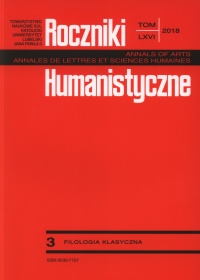Quia esse nolunt, bibant. On the Drowning of the Sacred Chickens and the Development of the Exemplum of P. Claudius Pulcher
Abstract
The motif of drowning the sacred chickens by P. Claudius Pulcher in 249 bc has been variously understood by modern scholars as either a historical fact or a later invention. T.P. Wiseman has gone so far as to call it “the hostile annalist’s masterpiece”. More important than its authenticity, however, seems to be the question: in what circumstances it had become a historical exemplum?
References
Alexander M.C.: Trials in the Late Roman Republic 149 BC to 50 BC. Toronto–Buffalo–London: University of Toronto Press 1990.
Assmann J.: Das kulturelle Gedächtnis. Schrift, Erinnerung, und politische Identität in frühen Hochkulturen. München: C.H. Beck 1997.
Blom van der H.: Cicero’s Role Models. The Political Strategy of a Newcomer. New York: OUP 2010.
Broughton T.R.S.: The Magistrates of the Roman Republic. T. II: 99 B.C.-31 B.C. NewYork: American Philological Association 1952.
Brouwer H.H.J.: Bona Dea. The Sources and a Description of the Cult. Leiden–New York–Cøbnhavn–Köln: Brill 1989.
Bücher F.: Verargumentierte Geschichte. Exempla romana im politischen Diskurs der späten Republik. Stuttgart: Franz Steiner 2006.
Chaplin J.D.: Livy’s Exemplary History. New York: OUP 2000.
Cicero’s Letters to Atticus. T. II: 58-54 B.C. Ed. D. R. Shackleton Bailey. Cambridge: CUP 1965.
Crawford J.W.: M. Tullius Cicero. The Fragmentary Speeches. An Edition with Commentary. Atlanta: Scholars Press 19942.
Epstein D.F.: Personal Enmity in Roman Politics 218-43 BC. London–New York: Routledge 1987.
Garzetti A.: M. Licinio Crasso, l’uomo e il politico. „Athenaeum” 19:1944 s. 1-61 = Idem. Scritti di storia repubblicana e augustea. Red. S. Accame. Roma: Storia e letteratura 1996 s. 127-184.
Hölkeskamp K.-J.: Exempla und mos maiorum. Überlegungen zum kollektiven Gedächtnis der Nobilität. W: Vergangenheit und Lebenswelt. Soziale Kommunikation, Traditionsbildung und historisches Bewußtsein. Red. H.-J. Gehrke, A. Möller. Tübingen: Gunter Narr 1996 s. 301-338.
Ihne W.: Römische Geschichte. Bd. II. Leipzig: Wilhelm Engelmann 1870.
Kowalski H.: Publiusz Klodiusz a religia rzymska w I wieku p.n.e. „Acta Universitatis Nicolai Copernici. Historia” 27:1992 z. 254 s. 67-75.
Liebeschuetz J.H.W.G.: Continuity and Change in Roman Religion. Oxford: Clarendon Press 2007.
Linderski J.: The Augural Law. „Aufstieg und Niedergang der römischen Welt” II 16:1986 z. 3 s. 2146-2312.
Loska E.: Uwagi na temat procedury ‘Obnuntiatio’. „Zeszyty Prawnicze UKSW” 11:2011 z. 1 s. 195-213.
M. Tulli Ciceronis. De divinatione libri duo. Ed. A.S. Pease. Darmstadt: Wissenschaftliche Buchgesellschaft 1963.
Marshall B.A.: A Historical Commentary on Asconius. Columbia: University of Missouri Press 1985.
Moreau P.: Clodiana religio. Un procès politique en 61 av. J.-C. Paris: Les Belles Lettres 1982.
Oppermann I.: Zur Funktion historischer Beispiele in Ciceros Briefen. München–Leipzig: K.G. Saur 2000.
Panitschek P.: Sp. Cassius, Sp. Maelius, M. Manlius als exempla maiorum. „Philologus” 133:1989 z. 2 s. 231-245.
Rasmussen S.W.: Public Portents in Republican Rome. Roma: «L’erma» di Bretschneider 2003.
Rawson E.: Intellectual Life in the Late Roman Republic. London: Duckworth 1985.
Richardson J.H.: The Fabii and the Gauls. Studies in historical thought and historiography in Republican Rome. Stuttgart: Franz Steiner 2012.
Robinson A.W.: Cicero’s use of people as exempla in his speeches. Diss. Indiana University 1986.
Roller M.B.: Exemplarity in Roman Culture: The Cases of Horatius Cocles and Cloelia. „Classical Philology” 99:2004 z. 1 s. 1-56.
Ross Taylor L.: Party Politics in the Age of Caesar. Berkeley–Los Angeles–London: University of California Press 1949.
Scheid J.: Le rite des auspices à Rome: quelle évolution? Réflexions sur la transformation de la divination publique des Romains entre le IIIe et le Ier siècle avant notre ère. W: La Raison des signes. Présages, rites, destin dans les sociétés de la Méditerranée ancienne. Red. S. Georgoudi et al. Leiden–Boston: Brill 2012 s. 109-128.
Schultz C.E.: A Commentary on Cicero, De divinatione I. Ann Arbor: University of Michigan Press 2014.
Scullard H.H.: Carthage and Rome. W: The Cambridge Ancient History. T. 7.2: The Rise of Rome to 220 B.C. Red. F.W. Walbank et al. Cambridge: CUP 20062 s. 486-570.
Sumner G.V.: Lex Aelia, Lex Fufia. „American Journal of Philology” 84:1963 z. 4 s. 337-358.
Thommen L.: Das Volkstribunat der späten römischen Republik. Stuttgart: Franz Steiner 1989.
Walbank F.W.: A Historical Commentary on Polybius. T. I. Oxford: Clarendon Press 1957.
Wiseman T.P.: Clio’s Cosmetics. Three Studies in Greco-Roman Literature. Bristol: Bristol Phoenix Press 2003.
Ziółkowski A.: Historia Rzymu. Poznań: PTPN 2008.
Copyright (c) 2018 Roczniki Humanistyczne

This work is licensed under a Creative Commons Attribution-NonCommercial-NoDerivatives 4.0 International License.





